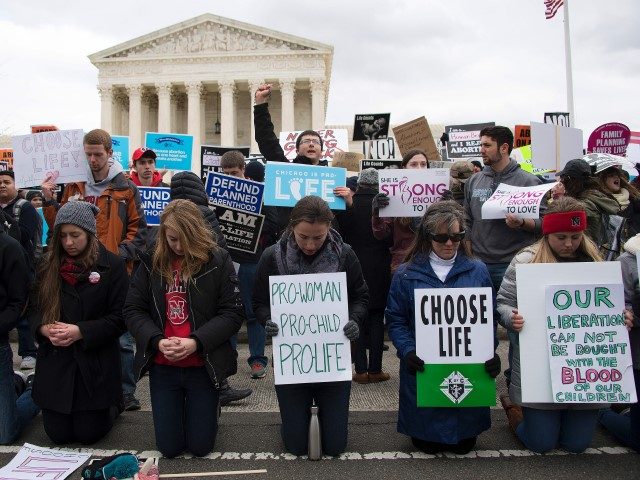The U.S. Supreme Court ruled Friday the Texas Heartbeat Act (S.B. 8), which bans abortions once a fetal heartbeat is detected, may remain in effect while abortion providers continue with their lawsuit against it in the lower court.
In the 5-4 pro-life win, with Chief Justice John Roberts siding with the abortion providers and Justices Clarence Thomas, Samuel Alito, Neil Gorsuch, Brett Kavanaugh, and Amy Coney Barrett with the majority, Gorsuch wrote for the majority:
In this preliminary posture, the ultimate merits question—whether S. B. 8 is consistent with the Federal Constitution—is not before the Court. Nor is the wisdom of S. B. 8 as a matter of public policy.
“Generally, States are immune from suit under the terms of the Eleventh Amendment and the doctrine of sovereign immunity,” Gorsuch continued, adding, “this Court recognized a narrow exception,” one that “allows certain private parties to seek judicial orders in federal court preventing state executive officials from enforcing state laws that are contrary to federal law.”
“But … this traditional exception does not normally permit federal courts to issue injunctions against state-court judges or clerks,” he noted, asserting:
Judges exist to resolve controversies about a law’s meaning or its conformance to the Federal and State Constitutions, not to wage battle as contestants in the parties’ litigation.
Addressing the dissenting opinions, Gorsuch wrote:
Simply put, nothing in any of our colleagues’ cases supports their novel suggestion that we should allow a pre-enforcement action for injunctive relief against state-court clerks, all while simultaneously holding the judges they serve immune.
[…]
Nor does Justice Sotomayor explain where her novel plan to overthrow this Court’s precedents and expand the equitable powers of federal courts would stop—or on what theory it might plausibly happen to reach just this case or maybe those exactly like it.
Gorsuch also addressed the appeal by the case’s sole private defendant, Mark Lee Dickson, director of Right To Life of East Texas and founder of the Sanctuary Cities for the Unborn Initiative:
In his appeal, Mr. Dickson argues that the petitioners lack standing to sue him because he possesses no intention to file an S. B. 8 suit against them. Mr. Dickson has supplied sworn declarations so attesting.
All nine justices unanimously agreed that the abortion providers did not have standing to sue a private person under such circumstances.
Gorsuch continued:
The truth is, many paths exist to vindicate the supremacy of federal law in this area. Even aside from the fact that eight Members of the Court agree sovereign immunity does not bar the petitioners from bringing this pre-enforcement challenge in federal court, everyone acknowledges that other pre-enforcement challenges may be possible in state court as well.
[…]
The truth is, too, that unlike the petitioners before us, those seeking to challenge the constitutionality of state laws are not always able to pick and choose the timing and preferred forum for their arguments.
Justice Clarence Thomas wrote in his partial concurrence:
To begin, there is no freestanding constitutional right to pre-enforcement review in federal court. Such a right would stand in significant tension with the longstanding Article III principle that federal courts generally may not “give advisory rulings on the potential success of an affirmative defense before a cause of action has even accrued.
[…]
Here, none of the licensing officials has threatened enforcement proceedings against petitioners because none has authority to bring them. Petitioners do not and cannot dispute this point.
“Rather, petitioners complain of the “chill” S. B. 8 has on the purported right to abortion,” Thomas added. “But as our cases make clear, it is not enough that petitioners ‘feel inhibited’ because S. B. 8 is ‘on the books.’”
The majority also dismissed a challenge from the Department of Justice against the Texas law, allowing only the suit by private parties to go forward against the law, with the potential to invalidate at a later time.
Other states have passed “heartbeat” bills, but, once signed into law, abortion rights activists filed lawsuits challenging them. Subsequently, courts have blocked these laws, ruling they are unconstitutional in light of the Supreme Court’s 1973 ruling in Roe v. Wade, in which the Court created a right to abortion, and subsequent decisions.
The Texas measure, however, contains a unique enforcement mechanism whereby any private citizen may file a civil lawsuit against an abortion provider or any other individual who “aids or abets” a “criminal abortion.” If the lawsuit is successful, all those sued must pay damages of at least $10,000 for each illegal abortion that was performed or received assistance.
The case is Whole Woman’s Health v. Jackson, No. 21–463 in the Supreme Court of the United States.

COMMENTS
Please let us know if you're having issues with commenting.